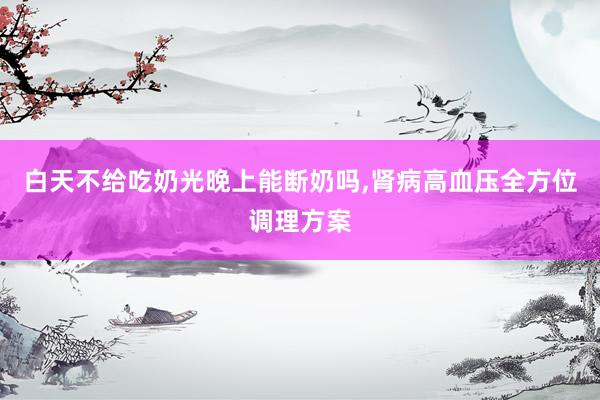
Causes of Renal Hypertension白天不给吃奶光晚上能断奶吗
Renal hypertension arises from various mechanisms within the kidneys. These include: - Increased renin-angiotensin-aldosterone system (RAAS) activity: The RAAS is a hormonal cascade that regulates blood pressure. In renal hypertension, impaired kidney function leads to increased renin release, which activates the RAAS, resulting in vasoconstriction and sodium retention. - Impaired pressure natriuresis: Normally, the kidneys increase sodium excretion in response to elevated blood pressure. In renal hypertension, this mechanism is impaired, leading to sodium and water retention, which further raises blood pressure. - Vasodilation defect: The kidneys release vasodilatory substances that counteract the vasoconstricting effects of the RAAS. In renal hypertension, these substances may be deficient or ineffective, exacerbating vasoconstriction and blood pressure elevation.Clinical Presentation and Diagnosis
一旦宝宝被确诊患有鹅口疮,家长应该立即采取相应的处理方法。保持宝宝口腔的清洁和干燥非常重要。家长可以用温开水或生理盐水清洁宝宝的口腔,然后用纱布或棉签轻轻擦拭宝宝的舌头和口腔黏膜。家长应该避免给宝宝喂食刺激性食物,如辛辣的食物、酸性食物等。如果宝宝症状较重,家长应该及时就医白天不给吃奶光晚上能断奶吗,接受专业的治疗。
鹅口疮一直不好会导致鹅的免疫力下降。长期受到病毒的侵袭和疼痛的折磨,鹅的免疫系统会受到损害。鹅口疮病毒会抑制鹅的免疫细胞的功能,使得鹅对其他病原体的抵抗力降低。这将使得鹅容易受到其他病菌的感染,导致二次感染的风险增加。
Symptoms Renal hypertension often presents asymptomatically. However, some patients may experience: - Headaches - Dizziness - Fatigue - Blurred vision Diagnosis Renal hypertension is diagnosed based on: - Elevated blood pressure (systolic ≥140 mmHg or diastolic ≥90 mmHg) - Evidence of underlying kidney disease, such as: - Proteinuria (protein in the urine) - Impaired kidney function (elevated creatinine levels) - Kidney ultrasound or biopsyTreatment Strategies
The primary goal of treating renal hypertension is to lower blood pressure and prevent complications. Treatment strategies include: Medications - RAAS inhibitors: Angiotensin-converting enzyme (ACE) inhibitors and angiotensin II receptor blockers (ARBs) effectively lower blood pressure in renal hypertension by blocking the RAAS. - Diuretics: These medications promote sodium and water excretion, reducing blood volume and blood pressure. - Calcium channel blockers: These medications relax blood vessels, reducing peripheral vascular resistance. - Beta-blockers: These medications slow the heart rate and reduce cardiac output, lowering blood pressure. Lifestyle Modifications - Sodium restriction: Reducing dietary sodium intake to less than 2,300 mg per day helps to decrease fluid retention and blood pressure. - Weight loss: Maintaining a healthy weight reduces the strain on the heart and kidneys, improving blood pressure control. - Regular exercise: Regular physical activity helps to lower blood pressure, improve kidney function, and reduce cardiovascular risk. - Smoking cessation: Smoking damages blood vessels and worsens renal hypertension.Specific Considerations in End-Stage Renal Disease
In end-stage renal disease (ESRD), dialysis or kidney transplantation is necessary to replace lost kidney function. Treatment of renal hypertension in ESRD requires: - Close monitoring of blood pressure: Blood pressure should be regularly monitored and adjusted with medications as needed. - Dialysis therapy: Dialysis removes fluid and waste products from the blood, which can lower blood pressure. - Kidney transplantation: A successful kidney transplant can restore normal kidney function and eliminate renal hypertension.Monitoring and Follow-Up
Regular follow-up with a healthcare provider is essential to monitor blood pressure control, adjust medications as needed, and assess overall kidney function. Home blood pressure monitoring can provide additional data to ensure adequate control.Prognosis and Prevention白天不给吃奶光晚上能断奶吗
With appropriate treatment, most patients with renal hypertension can achieve blood pressure control and reduce their risk of complications. Prevention of renal hypertension involves managing underlying kidney disease, maintaining a healthy lifestyle, and controlling other cardiovascular risk factors. Conclusion Renal hypertension is a serious condition that requires prompt diagnosis and treatment. By understanding the causes, clinical presentation, and treatment strategies, healthcare providers can effectively manage renal hypertension, improving the health outcomes and quality of life for patients with kidney disease. Collaboration between patients, healthcare providers, and lifestyle modifications is crucial to achieving optimal blood pressure control and preventing complications.